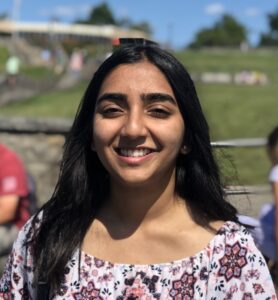This is part of a series of posts by recipients of the 2021 Career Services Summer Funding Grant. We’ve asked funding recipients to reflect on their summer experiences and talk about the industries in which they spent their summer. You can read the entire series here.
This entry is by Nikita Patel, COL ’24
 This past summer of 2021 I had the opportunity to intern at Kentucky Refugee Ministries (KRM), a refugee resettlement agency in Louisville, KY. This quaint building on shared land with the neighboring church is so much to their clients who include not only refugees but also asylees, Special Immigrant Visa holders (SIVs), and Cuban and Hatian migrants. It houses caseworkers, victims’ advocates and immigration attorneys, English as a Second Language (ESL) classes, citizenship classes, employment coordination, housing coordination, youth service and education access, elder coordination, mental health services, and the office I spent most of my time with: the medical office.
This past summer of 2021 I had the opportunity to intern at Kentucky Refugee Ministries (KRM), a refugee resettlement agency in Louisville, KY. This quaint building on shared land with the neighboring church is so much to their clients who include not only refugees but also asylees, Special Immigrant Visa holders (SIVs), and Cuban and Hatian migrants. It houses caseworkers, victims’ advocates and immigration attorneys, English as a Second Language (ESL) classes, citizenship classes, employment coordination, housing coordination, youth service and education access, elder coordination, mental health services, and the office I spent most of my time with: the medical office.
As a nursing student pursuing global health, this was an invaluable experience. I was able to get a niche understanding of the refugee experience, practice languages including Spanish, Urdu/ Hindi, and Arabic, identify what culturally appropriate care and education means, explore barriers that exist in healthcare processes, and how multiple organizations including NGOs like KRM, national and international institutions like the CDC, International Organization of Migration (IOM), and the UN Refugee Agency (UNHCR) as well as local organizations such as clinics and sponsor groups cooperate to ensure quality public health.
As an intern, the first thing I learned to do was how to put together the health background of incoming clients in order to coordinate and triage care plans alongside and pursuant to initial health screenings. This would then lead to coordinating follow-ups such as for latent tuberculosis treatment, specialist referrals, and further education such as learning bus routes, differentiating between emergency, immediate, and primary care, and the importance of carrying insurance cards. If clients would forget their insurance cards to healthcare institutions they would fluster into the office with bills beyond their means. I could often resolve this as it was usually as simple as making their connection to an interpreter, providing insurance information, or backdating their insurance; however, this was only if they had insurance or were eligible for medicaid in the first place.
As the summer progressed and the rate of incoming clients increased, it became difficult for the medical affiliates of KRM to keep up. The “Trump era” alongside COVID-19 drastically squashed the number of incoming refugees, thus affiliate clinics which were once sustained by the influx of refugees dwindled in their capacity. In the lengthy time it would take to renew these relationships and resurrect closed doors, primary care was still needed for clients that could not be cared for where they had their initial health screenings as their predecessors could. I then worked to create a directory of refugee and migrant-friendly primary care options within the area taking into account distance from popular residences, availability of interpreters, hospital networks, acceptance of children, and medicaid capacities.
Despite the hardships COVID-19 created in the deliverance of care to refugees, including isolation post arrival, lack of in-person interpreters, and minimization of contact with caseworkers, it presented unique times to study the workings of an NGO and healthcare education in diverse populations, such as the ability to present vaccines as not only means to a green card, but a safe concept that parallels precaution.
As what will always be bureaucratic necessity, interning also included case-noting and filing paperwork. This also came with the understanding that when a refugee climbed onto a plane, their identity became fundamentally intertwined with such paperwork. I am grateful to KRM, the refugees I worked with, and the funding I received to have gained such an enriching experience.




